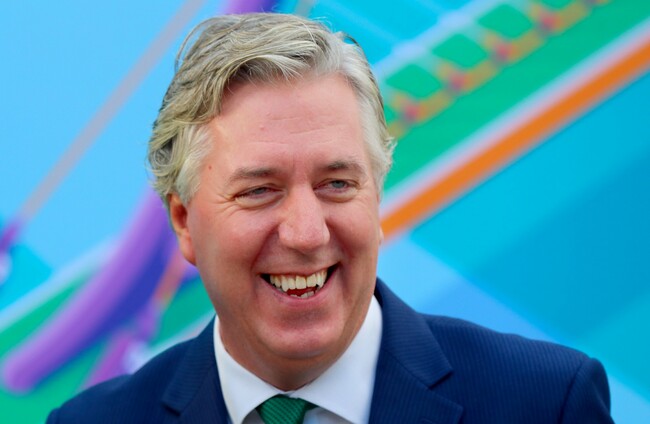LAST UPDATE | 22 Sep 2020
IF YOU’RE READING Champagne Football by Mark Tighe and Paul Rowan: best to maintain a two-metre social distance from others to give you enough room to stoop and scoop your jaw from the floor.
Regardless, you won’t be stooping as low as Irish football did during the John Delaney Years, a 15-year era of bewildering excess and wretched financial mismanagement that left the FAI needing a State bailout to avoid collapse.
Mark and Paul brought it all to light with a series of extraordinary revelations in the Sunday Times last year, and have built on and further explained the story in their new book, Champagne Football. They are our guests on Behind the Lines this week, with the 45-minute conversation exclusive to members of The42.
(To sign up and gain instant access to the show’s 45-episode back catalogue, head to members.the42.ie.)
The book isn’t just a reheat of the shocking revelations printed by the Sunday Times last year – there are plenty more where they came from – but it also charts Delaney’s rise to a position of extraordinary power at the FAI.
Ruth Coppinger branded Delaney’s stonewalling at the Oireachtas Committee last year as “Hamlet without the prince”, and to stretch out the metaphor, this book is very much Hamlet with the prince, albeit with more palace bloodletting and perhaps an equally dominant parent/child dynamic.
The book begins with the demise of John Delaney’s father Joe, ousted in 1996 over the Merriongate ticketing scandal.
While telling the story of “The Night of the Long Knives”, and FAI Council meeting at which Joe Delaney resigned from his role as Honorary Treasurer in the teeth of the Merriongate scandal, the book quotes Tony O’Donoghue, who interviewed John on the night for RTE.
The scene “felt kind of Shakespearean”, says Tony, who goes on to say in the years that followed, he “would often think so much of [John's] motivation was to restore the reputation of Joe.”
The figure of Joe came up during our podcast conversation with Mark and Paul, when I asked Paul if the writing of the book brought him any closer to understanding what really drove Delaney.
“I think he was somebody who was desperate to be loved by everybody, in some ways. He wanted to be loved and admired by the grassroots and he wanted the same from the fans. Then he seemed to try to become a bit of a national celebrity. So he seemed to have a great desire to be loved by everybody.
“One of the theories going around was, was he trying to impress his father? That is a theory we may never know the definitive answer to.
“His father is a very gregarious kind of character, he is described almost as a kind of Arthur Daley figure, but was actually really well liked, as an individual, by a lot of people in the Football Association of Ireland before he left the association in 1996. And John really kind of came in his place from then.
“And one always got the sense that Joe was quite a powerful figure in the background, and not just in terms of his advice, but his personality, and that maybe John was driven by a desire to in some ways pick up his father’s legacy, and also to impress his father by exceeding what he had done, in terms of the amount of power that he enjoyed at the Association.
“Unless John tells us, we may never know.”
Paul did contact Joe for a comment, given he was mentioned in the book, but the conversation was brief.
“He was defiant and, again, it seemed to be all the media’s fault. I think he called us scumbags and ‘the yellow pack press’, and left me with a bit of a flea in my ear, it has to be said. He said, ‘Don’t call back’ and we respected that.
“He obviously wanted to make the point that, essentially, the Delaneys had been more wronged than wronging. That seemed to have been his way of looking at it.
“I think John Delaney might feel that way himself. But it may be that other people will make the ultimate decision on that.”
The above is just one strand to our conversation about the FAI: Mark reflects on the high drama of Delaney’s late (and failed) attempt to injunct the story about the unexplained €100,000 cheque from which the entire story unspooled; Paul looks back on what it was like for the journalists trying to break through the secrecy of The Delaney Years; and there’s some talk about the John the Baptist documentary too.
Listen to the full conversation by subscribing at members.the42.ie.
Champagne Football by Mark Tighe and Paul Rowan is published by Penguin Sandycove and is available now.


